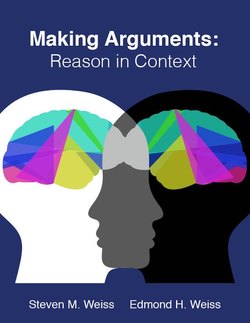Читать книгу Making Arguments: Reason in Context - Edmond H. Weiss - Страница 11
На сайте Литреса книга снята с продажи.
Principle #2—Arguing is not just expressing opinions.
ОглавлениеArgument is too often confused with the mere expression of one’s opinion, an idea rooted largely in the previously discussed misconception about argument as a form of verbal fisticuffs. Most people view argumentation as a conflict in which competing interests are being aired, perhaps without regard to whether the participants in the dispute “make sense.” For many, argument is “ventilation,” a way of getting emotion and frustration aired.
To study argument, however, one should avoid the tendency to characterize arguments dismissively as “opinions” or “mere opinions.” Any statement or claim can be qualified as an opinion. Adding this qualification to a claim does nothing to diminish its status as the conclusion of a rational chain of reasoning coupled with evidence. Nor does saying something is “just an opinion” put it on an equal footing with a rationally adduced claim, assuming that the baseless claim is made without support. (Calling something “just an opinion” is nearly as vacuous as dismissing a scientific argument as “just a theory.”)
A similar error is to believe that an unsupported opinion, expressed by someone else, is evidence in support of one’s own opinion. There is a tendency among inexperienced advocates to view the opinions of others as all the backing they need to win the adherence of an audience or judge. Novice debaters often read the “opinion” statements of others, and then assert that a claim has been proven. It turns out that an argument might not be advanced one bit by this technique of argument. (In subsequent chapters, we will examine in detail how evidence is handled. We will also discuss some fallacies that stem directly from the misuse of “opinion” as evidence.)
